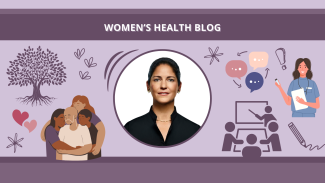Interviewee: Lisa Richardson | Authors/Editors: Romina Garcia de leon, Shayda Swann (Blog Co-coordinators)
Published: April 19th, 2023
What was the motivation to get the Centre for Wise Practises in Indigenous Health started at Women’s College?
The initial motivation was based on observing the experiences of Indigenous peoples in the healthcare system, both those seeking care and Indigenous learners being trained as healthcare professionals. There was a desire to have a place where people would feel supported and not have to deny their Indigeneity but be in a place where that's valued and seen. We wanted to create a place where one can have access to traditional cultural supports if needed and where they can be supported as a whole person – mind, body, spirit, and emotion in that model of care and well-being.
Additionally, the Centre emerged at the time that it did because the Truth and Reconciliation Commission of Canada (TRC) had come up with specific health-related Calls to Action. I had been involved in writing a report around how healthcare institutions could incorporate those calls to action specifically, and so we sought to do that at Women's College Hospital.
How are healthcare providers educated on Indigenous health?
We have some amazing online modules that exist for cultural safety. But there is also a need to come together in small groups and talk through some of what was heard. We sometimes debrief provider and patient interactions. For instance, if there was an incident where a patient felt uncomfortable, we want to ensure that the patient is supported but also consider how to make things better for next time. This might include a specific healing session, facilitated by an Elder, where a provider and a patient come together and try to emerge from it in a restorative way. We also have speakers for important events like the Missing and Murdered Indigenous Women and Girls annual day of recognition and the National Day for Truth and Reconciliation. Through dialogue, small groups, and one-on-one conversations we try to educate healthcare providers on Indigenous health.
Since its opening in 2018, what have been the major outcomes of this initiative?
One of the teachings that I had from an Elder on our Decision-Making Council was “Lisa, build a small fire and people will want to come.” I interpreted it as “don't start by wanting to build this great big program. Just start by doing the work within Women's College and eventually, people will want to participate if it’s done in a good way.” We have very strong community partnerships. We have an Elder-in-Residence who has a Traditional Medicine clinic. We have hired a Patient Relations advocate–an Indigenous peer support and a patient and relations advocate who will sit with patients to accompany them on their journey and connect them to resources both within and outside the hospital. We additionally have a team that goes into community organizations, meets with individuals and tells them about what we’re doing. I feel very strongly about recruiting and supporting the next generation of Indigenous people in health care–advocates, leaders, providers, and scientists, and so we have a lot of Indigenous learners who do their placements or work on projects with us. We have a collaboration with the medical school, which means that Indigenous medical students come and hang out in our space where they can be surrounded by Indigenous peoples, and connect with community members and Elders. We also have an amazing summer camp program for grades 9-10 Indigenous learners. Beyond the hospital, we have worked on outreach programs to help support Indigenous primary care practitioners who are working in isolation and on the reserves. We have specialists who are going out to the reserves to provide consultations as needed.
When incorporating Indigenous voices, how do initiatives and foundations avoid non-meaningful engagement and prevent tokenism?
I think building something slowly and carefully and led by Indigenous peoples has been important for us as well. This is the opposite of having a single person in a single role and on their own trying to transform a whole institution, which is generally not successful. Importantly, we have Indigenous people in senior leadership roles overseeing everything we do for accountability purposes. I think one important structural aspect of the Centre is the dual accountability within my role. I report both to the CEO and to our Decision-Making Elders. I do my check-ins with both and thus am held accountable by leaders in our community who can advise me on what would and wouldn’t be appropriate. This is essential for me because it helps ensure that the work is grounded in the needs of our people.
Why the focus on women’s health?
There's a reason why we're centred at Women's College Hospital. It's a hospital that cares for all people but understands some of the specific needs of women and gender-diverse peoples in healthcare. At our Centre, we understand that for our communities and for the future generations to be healthy, we need women, children and families to be healthy.
